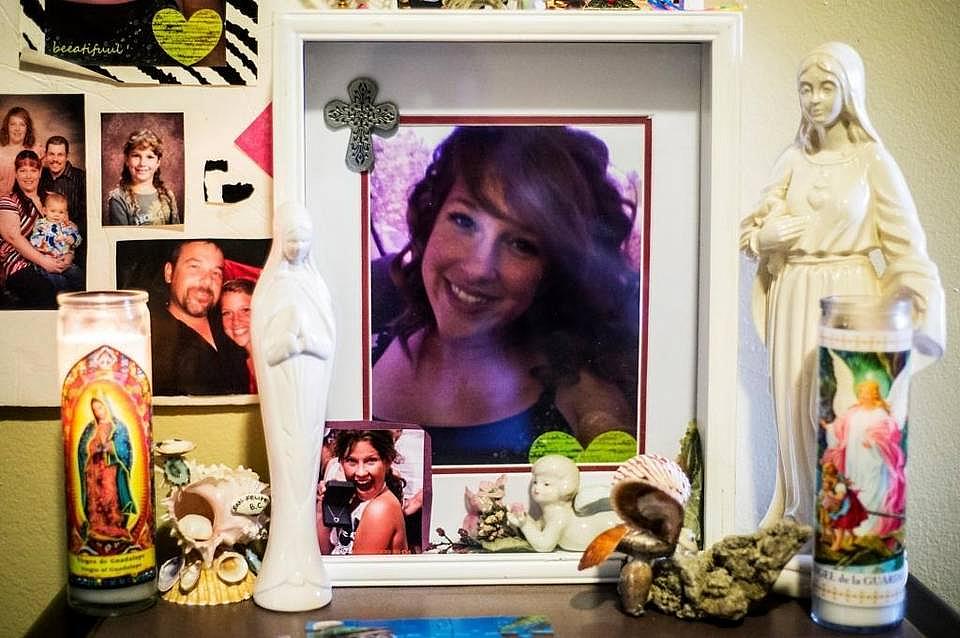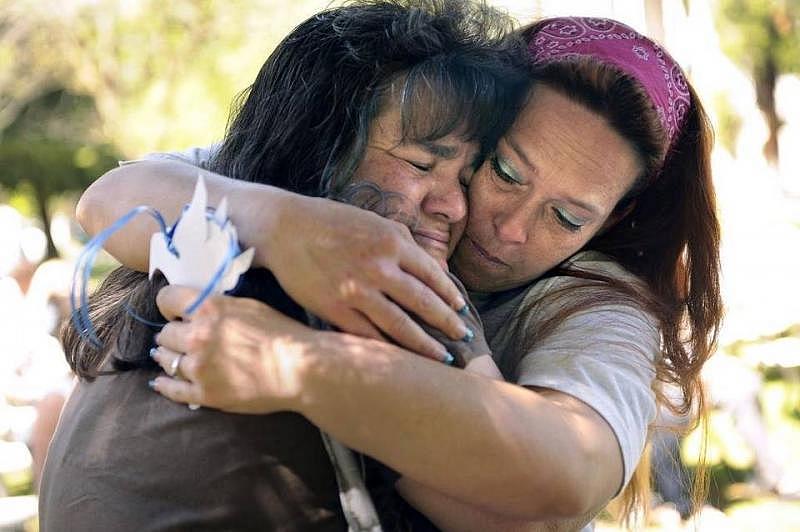Unspoken emotional damage looms over victims of violence in Merced County
Ana B. Ibarra wrote this story, the first in a three-part series for the Merced Sun-Star, as a fellow of the California Health Journalism Fellowship at USC’s Annenberg School of Journalism.
Other stories in the series include:
Violent traumas bear array of often buried health issues
Merced County residents work toward safer, healthier neighborhoods

A photo of Samantha Parreira sits in the home of her mother, Desiree Parreira, in Atwater.
She lay on her bedroom floor, face down, frozen. She remembers counting at least 10 gunshots.
This wasn’t the first time Desiree Parreira had heard gunshots, but it was the closest to her home. The incident happened earlier this summer, she said, just a short distance from her bedroom in an alley behind her Broadway Avenue apartment in Atwater.
She called out to her 7-year-old son, ordering him to get on the ground. He did as he was told. She heard yelling and footsteps. Minutes later, the alley was clear, as if nothing had ever happened.
Parreira’s greatest fear is losing a child to a bullet – again.
She doesn’t know if she could handle all the pain and turmoil that comes with losing a loved one to street violence once more.
On March 31, 2013, Parreira lived a parent’s worst nightmare when her 16-year-old daughter, Samantha, was shot and killed at a house party in Atwater.
Parreira remembers waking up that Easter Sunday to a knock on her door. Merced County sheriff’s detectives told her Samantha was in critical condition at a Modesto hospital.
Samantha had been shot in the chest, and a bullet was lodged in her spine.
“I sat there and held her hand, cleaned blood out of her ears and nose,” she said. “It’s a pain that I never want any mother or father to have to experience.”
A little before noon that day, Samantha was taken off life support. She stopped breathing at 12:05 p.m.
Spike in violent crime
Parreira’s experience sparked uneasiness, depression, anxiety and resentment, but she knows that in a county where violence is on the rise, she can’t be the only one who feels this way.
Samantha’s death was one of three that night at the same party, and one of 30 homicides in Merced County in 2013 – a record at that time.
That number was trumped last year, when the county recorded 32 homicides. Based on the county’s estimated population of 255,793, that is equivalent to 12.51 homicides per 100,000 people.
The state average is 4.6 homicides per 100,000 people, according to the California Department of Justice. The national average is 4.5 homicides per 100,000 people.
In 18 of last year’s cases, the victims were between 15 and 29 years old, according to the Merced County coroner.
“The last two years have been the bloodiest in Merced County’s history, with more than 60 homicides,” District Attorney Larry Morse II said in May after a five-month investigation resulted in the arrest of 75 gang members.
“Even more disturbing is that it comes at a time when violent crime in California has been reaching historic lows,” he said. “We’ve been moving in a bad way against the tide.”
Effects from this violent wave carry vast and often unspoken consequences in a community that sees far more than its share of brutality.
A parent’s grief

Parreira is numb to the statistics. They don’t mean much to her now. All she knows is that she wakes up every morning without her daughter.
“It’s like someone reaches in your chest and pulls out your heart, squeezes all the life out of it, sticks it back in there and expects you to go on,” Parreira said.
Merced residents Diane Reis and Robert Fisher lost a son, Matthew, the same night Samantha was killed.
According to a report filed by Merced County sheriff’s detectives, Matthew Fisher, 19, and Samantha were sitting together on a bench in the backyard of the Westside Boulevard house when two suspected gang members approached and fired.
Samantha screamed and she and Matthew fell forward, clutching their chests, the report said.
About nine months after Matthew’s death, his brother, Marcus Fisher, 21, was gunned down at a New Year’s party in Merced.
“It was devastating. We (were) just rebuilding from Matt,” Robert Fisher said. “It took us back to zero, knocked us off our feet again.”
Some days are harder than others. Reis and Fisher said they lean on each other and their two remaining children to keep themselves from sinking into depression. Reis said since the death of her two boys it has become difficult to concentrate on anything else.
She feels angry and tired.
The tragedy of losing children to violence is also accompanied by great stress and guilt, the parents shared.
"Diane Reis, mother of murder victims Matthew Fisher, 19, and Marcus Fisher, 21, is embraced by Desiree Parreira, mother of Samantha Parreira, 16, during Merced County’s annual victims rights ceremony in 2014".“You wonder if you could have been a better parent,” Fisher said. “What keeps us strong is the good memories, the good love.”
Dealing with the pain of losing a child, the parents said, is only made worse when people assume the worst of their sons because of the nature of their deaths.
“I try to overlook (the comments) because (people) don’t know,” Fisher said. “It could happen to anybody. When a bullet leaves a gun, it has no mind, no eyes; it can strike anyone.”
Reis has attended every court hearing in Matthew’s case, which has caused her mental and emotional fatigue, but she wants answers. Fisher, on the other hand, decided to skip the most recent hearing.
“I didn’t go because they were going to talk about how he was struck,” Fisher said. “I don’t think I’m ready to hear all that.”
In Marcus’ case, no arrests have been made, which only adds frustration to their mix of emotions. “Someone out there knows something,” Fisher said.
Coping and healing
Parreira credits her family and friends for keeping her strong. But there are days, she confessed, when she goes into a slump.
“Depression, I have it; I hide it,” she said. “I don’t want people feeling sorry for me because my daughter is gone.”
She hasn’t sought professional help but says she has not ruled out the possibility.
Juliana Rocha, a behavioral health clinician at Livingston Community Health center, said she often works with victims of violence and their families. She understands that not everyone will seek professional help. Most, she said, won’t seek it immediately.
Parents and family members who have lost loved ones to violence may take a little longer to heal than those who have lost someone to an illness, for example, because they are also dealing with anger and the feeling of betrayal, therapists say.
Rocha said parents seek help at different stages of grief. These can include denial, guilt, isolation, reflection, acceptance and reconstruction.
In most cases, families of homicide victims will be offered counseling resources by law enforcement and the county’s Victim Assistance program. However, parents are typically so overwhelmed with the pain of losing a child that they don’t think about themselves or their health, Rocha explained.
“Patients are not ready to listen during these initial stages,” Rocha said. “They’re still numb at that point.”
Parents who are trying to cope with grief often experience insomnia and detachment.
Parreira can attest to this. She doesn’t often sleep well.
“(You’re) going to bed thinking you’re going to have a good night’s sleep, but as soon as you close your eyes, you see your daughter hooked up to a respirator or you see her lying in the casket,” Parreira said.
Healing takes time and support. Rocha said dealing with the loss of a loved one is best dealt with in groups. “If you have peer support, you have better outcomes,” Rocha said.
Livingston Community Health recently launched a support group called Mujeres a Mujeres, or Women to Women. The goal, Rocha said, is to get women to share their stories of violence.
But everyone heals at his or her own pace.
Parreira said it saddens her that her children did not grow up in the same Merced County she remembers as a child.
“Merced wasn’t like this,” she said. “It used to be safe.”
[Photographs by Andrew Kuhn and Bea Ahbeck Casson.]
